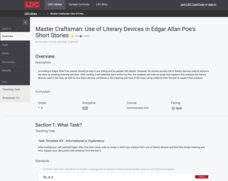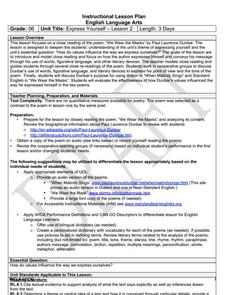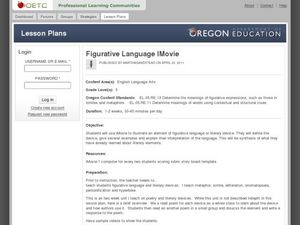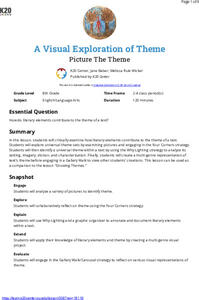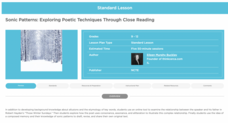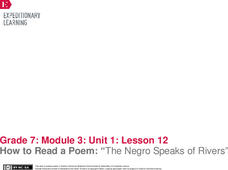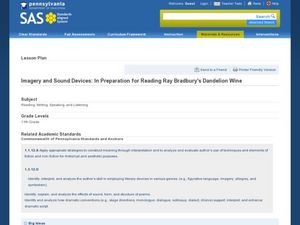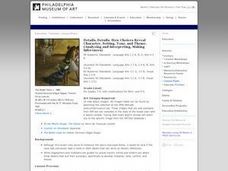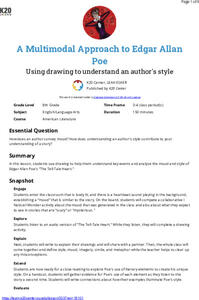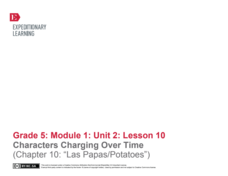Curated OER
Analyzing Literary Devices
Eighth graders identify figurative language and poetry in this literary analysis lesson. Using Through the Looking Glass by Lewis Carroll and a YouTube video for "The Walrus and the Carpenter," young readers complete a literary device...
Southern Nevada Regional Professional Development Program
Reading Literature - Romeo and Juliet
“What is the theme of this story?” Now there’s a question all pupils dread. Rather than encountering a sea of faces that look like they were painted by Edward Munch, face a classroom filled with smiles and confidence. Show your readers...
Literacy Design Collaborative
Master Craftsman: Use of Literary Devices in Edgar Allan Poe's Short Stories
Make the writing process a breeze for literary lovers. Scholars identify literary elements in Poe's The Tell-Tale Heart. They then choose their own short story from Edgar Allan Poe and repeat the processes independently. The final...
MENSA Education & Research Foundation
Magical Musical Tour: Using Lyrics to Teach Literary Elements
Language arts learners don't need a lecture about poetry; they listen to poetry every day on the radio! Apply skills from literary analysis to famous songs and beautiful lyrics with a lesson plan about literary devices. As class...
Curated OER
6th Grade: Express Yourself, Lesson 2: Close Read
The second activity of a pair about Paul Laurence Dunbar, this plan focuses in particular on his poem, "We Wear the Masks." After a short historical introduction, class members conduct a series or readings, marking up the text and...
Curated OER
Figurative Language iMovie
In order to understand figurative language, learners read 5 poems, each exemplifying a different literary device. They discuss and write responses to each poem. They then choose one literary device which they will use as the basis for a...
Curated OER
Analyzing the Use of Irony in a Short Story
Ninth graders examine how literature connects to real-life and see how irony aids in the development of theme. They read Shirley Jackson's The Lottery, and discuss elements of foreshadowing and situational irony. Then learners will write...
Curated OER
Persuasion in Historical Context: The Gettysburg Address
The Gettysburg Address is a powerful text. Use it to teach persuasion and the importance of word choice. The activity detailed here includes a scaffolded background knowledge activity that includes image analysis of photos from the Civil...
Alabama Learning Exchange
J. Alfred Hyperbolizes
Mermaids will sing to your class members as they engage in an activity related to T.S. Eliot's famous dramatic interior monologue. After engaging in a socratic seminar about literary devices in the poem, individuals choose one...
Curated OER
Of Mice and Men: Chapter 3 Reading and Study Guide
Boost comprehension with an excellent reading guide for chapter 3 Of Mice and Men. Learners define four vocabulary words, note one allusion, define five literary terms, and respond to 31 short answer questions regarding the Steinbeck...
EngageNY
Revisiting Big Metaphors and Themes: Revising and Beginning to Perform Two-Voice Poems
Now that your class has read all of Esperanza Rising, take the time to tackle big metaphors and themes. Pupils will participate in an activity called Chalk Talk, in which they circulate around the room in small groups and add comments to...
Curated OER
Lesson Plan for C.S Lewis’ The Magician’s Nephew
Here is a activity that incorporates music writing, and reading literature. The class reads chapter eight from the C.S. Lewis classic The Magician's Nephew. Then, just like in the story, they use music as inspiration to create (write)...
Curated OER
A-MOO-sing Fun with Hilda Mae Heifer!
Students practice identifying literary devices by reading books by author Margie Palatini. In this literary devices lesson plan, students create a class list of onomatopoeic words found in the text then work to generate more examples on...
K20 LEARN
A Visual Exploration Of Theme: Picture The Theme
"What is the theme of this story?" Now there's a question that can strike fear in the hearts of learners. Here's a lesson that uses photographs to introduce the concept of theme. Scholars examine six photographs and then attach a theme...
ReadWriteThink
Sonic Patterns: Exploring Poetic Techniques Through Close Reading
Robert Hayden's poem "Those Winter Sundays" serves as the anchor text in a five-part lesson plan that takes the mystery out of poetry analysis by modeling explicit strategies for pupils to employ to conduct a close reading of a poem....
Lafayette Parrish School System
Teaching Tone and Mood
Tone and Mood are not synonymous! Introduce young readers to these literary devices with a series of exercises that not only point out the significant differences between the terms but also shows them how to identify both the tone and...
Learning for Justice
Maya Angelou
Maya Angelou's poem, "Still I Rise", offers young scholars an opportunity to consider how poets use literary devices to create powerful messages. After a close reading and discussion of the poem, class members reflect on how they can...
EngageNY
How to Read a Poem: “The Negro Speaks of Rivers”
Learners listen as a teacher models how to read a poem using The Negro Speaks of
Rivers. They use the How to Read a Poem anchor chart to help guide their thought process on how a poem requires different reading than other text. While...
Curated OER
Imagery and Sound Devices: In Preparation for Reading Ray Bradbury's Dandelion Wine
Twelfth graders analyze Ray Bradbury's use of techniques and elements of fiction as well as nonfiction in the novel Dandelion Wine. In this novel analysis lesson plan, 12th graders analyze the sensory techniques in Dandelion Wine....
Curated OER
Analyzing Poetic Devices: Robert Hayden's "Those Winter Sundays" and Theodore Roethke's "My Papa's Waltz"
High schoolers examine how Robert Hayden and Theodore Roethke incorporate poetic devices to convey meaning in the poems, 'Those Winter Sundays,' and 'My Papa's Waltz.' They listen to audio clips, explore websites, and write an analysis...
Curated OER
Details, Details: How Choices Reveal Character, Setting, Tone, and Theme. (Analyzing and Interpreting, Making Inferences)
Students respond to works of art. In this art interpretation lesson, students examine images of art while using concepts they learned as they read literary pieces. They detail the setting, characters, and the mood and theme of the works...
K20 LEARN
A Multimodal Approach To Edgar Allan Poe Using Drawing To Understand An Author's Style
True! Poe's "The Tell-Tale Heart" makes readers nervous. But how? Young scholars create a drawing while listening to a reading of Poe's eerie tale to understand how writers create the mood of their stories and what their writing style...
EngageNY
Characters Changing Over Time (Chapter 10: "Las Papas/Potatos")
Engage further in Esperanza Rising with a focus on close reading and metaphor. Class members zero in on the tenth chapter, examining characters and big ideas. Pupils discuss the text in small groups and as a whole class, and participate...
K20 LEARN
It Wasn't Me: "The Crucible"
Scholars complete their study of the collective fear in Arthur Miller's "The Crucible" by conducting a mock trial to determine how many witches are in the class. Groups then analyze sections of the play for the literary devices used and...




